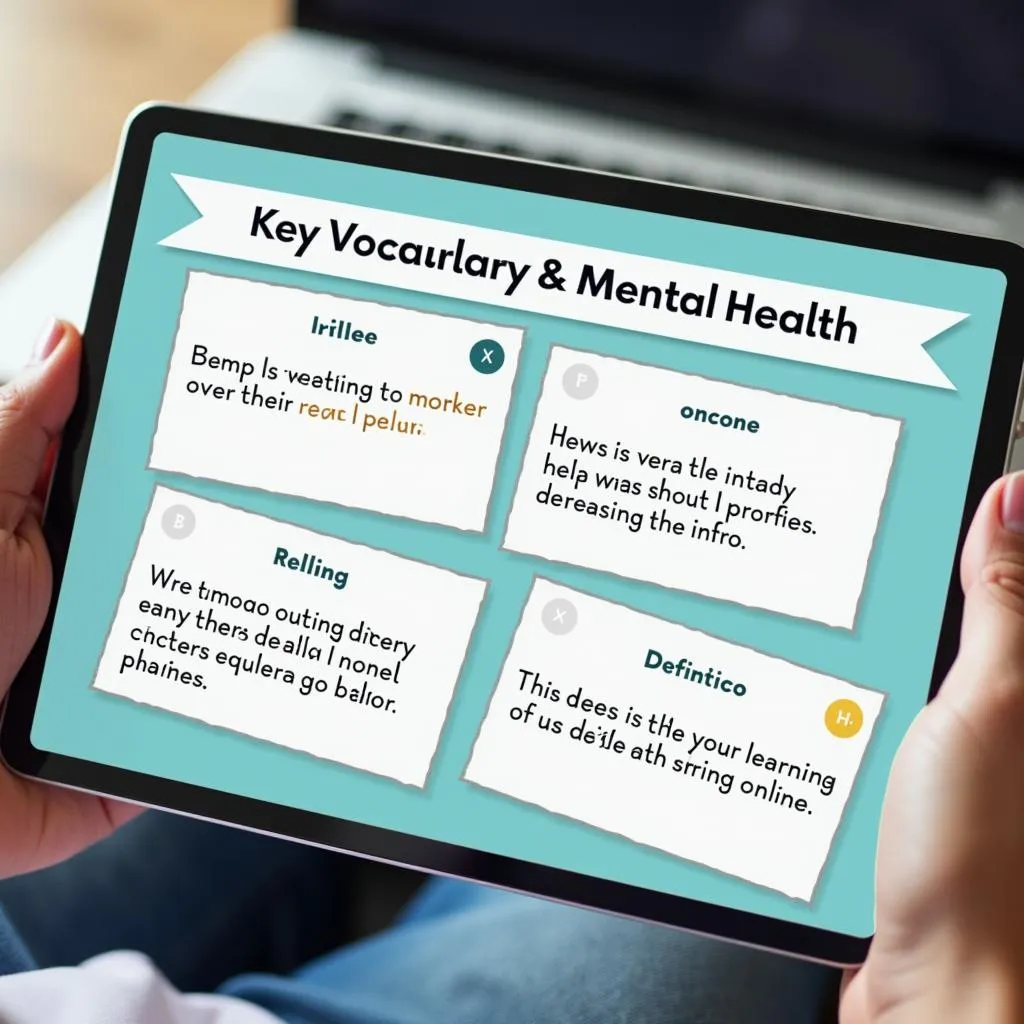Online learning has become a prevalent topic in IELTS Writing Task 2 essays, particularly in light of recent global events. The impact of online learning on student mental health is a subject that has gained significant attention and is likely to appear in future IELTS exams. Based on past exam trends and current educational discussions, here are two relevant essay questions that have been observed in recent IELTS tests:
-
Some people believe that online learning has negatively impacted students’ mental health, while others argue it has provided more flexibility and reduced stress. Discuss both views and give your opinion.
-
The shift to online education has changed the way students interact and learn. What are the positive and negative effects of this change on students’ mental well-being?
For this article, we will focus on the first question as it presents a balanced approach to the topic and allows for a comprehensive discussion of the issue.
Analyzing the Essay Question
Some people believe that online learning has negatively impacted students’ mental health, while others argue it has provided more flexibility and reduced stress. Discuss both views and give your opinion.
This question requires the writer to:
- Discuss the negative impacts of online learning on students’ mental health
- Explore the positive aspects, such as increased flexibility and reduced stress
- Provide a personal opinion on the overall impact
It’s crucial to address all parts of the question and provide a balanced argument before stating your own view.
Sample Essay 1 (Band 8-9)
The shift to online learning has sparked debates about its effects on students’ psychological well-being. While some argue that it has detrimental impacts on mental health, others contend that it offers greater flexibility and alleviates stress. In my opinion, while online education does present certain challenges, its benefits for mental health outweigh the drawbacks when implemented effectively.
Those who criticize online learning often point to increased isolation and screen fatigue as primary concerns. The lack of face-to-face interaction with peers and teachers can lead to feelings of loneliness and disconnection, potentially exacerbating existing mental health issues. Moreover, prolonged exposure to digital devices can result in eye strain, headaches, and disrupted sleep patterns, all of which can negatively affect a student’s overall well-being.
On the other hand, proponents of online education emphasize its flexibility and potential to reduce certain stressors. Students can often create their own schedules, allowing them to balance academic responsibilities with personal needs more effectively. This autonomy can lead to reduced anxiety related to time management and commuting. Additionally, for some students, particularly those who experience social anxiety or bullying in traditional classroom settings, online learning provides a safer and more comfortable environment for participation and self-expression.
In my view, the potential mental health benefits of online learning are significant when proper support systems are in place. The flexibility it offers can greatly reduce stress and improve work-life balance, which are crucial factors in maintaining good mental health. However, it is essential for educational institutions to implement strategies that address the challenges of online learning, such as incorporating regular virtual social activities and providing resources for managing screen time and maintaining physical health.
In conclusion, while online learning does present some mental health challenges, I believe that its potential to offer flexibility and reduce certain stressors can have a positive impact on students’ well-being when implemented thoughtfully. As education continues to evolve, it is crucial to find a balance that harnesses the benefits of online learning while mitigating its potential drawbacks.
(Word count: 329)
 Online learning impacts on student mental health
Online learning impacts on student mental health
Sample Essay 2 (Band 6-7)
The topic of online learning and its effects on students’ mental health is widely debated. Some people think it has had a negative impact, while others believe it has made studying more flexible and less stressful. In my opinion, online learning has both good and bad points when it comes to mental health.
On the negative side, online learning can make students feel isolated. When studying from home, they don’t get to see their friends or teachers in person, which can be lonely. Also, spending a lot of time looking at computer screens can cause headaches and make it hard to sleep, which isn’t good for mental health.
However, there are also positive aspects to online learning. Students can often choose when to study, which can help them feel less stressed about time management. They don’t have to travel to school, which saves time and energy. For some students who don’t like being in a classroom, online learning can be less stressful.
In my view, online learning can be good for mental health if it’s done right. The flexibility it offers is really helpful for managing stress. But schools need to make sure they help students stay connected with others and take care of their physical health too.
To sum up, I think online learning can have both positive and negative effects on mental health. It’s important to find ways to get the benefits while reducing the problems. As education changes, we need to keep thinking about how to make online learning better for students’ well-being.
(Word count: 261)
Explanation of Band Scores
Band 8-9 Essay Analysis:
This essay demonstrates excellent writing skills and a sophisticated approach to the topic, warranting a high band score:
-
Task Achievement: The essay fully addresses all parts of the task, providing a well-developed response with relevant, extended, and supported ideas.
-
Coherence and Cohesion: The essay is cohesive with clear progression throughout. It uses a range of cohesive devices and each paragraph has a clear central topic.
-
Lexical Resource: The vocabulary used is sophisticated with very natural and precise usage. Examples include “exacerbating,” “autonomy,” and “mitigating.”
-
Grammatical Range and Accuracy: The essay uses a wide range of structures with full flexibility and accuracy. Complex sentences are used effectively, and there are no noticeable errors.
Band 6-7 Essay Analysis:
This essay demonstrates good writing skills but lacks some of the sophistication of the higher band essay:
-
Task Achievement: The essay addresses all parts of the task, but some points are not fully extended or supported.
-
Coherence and Cohesion: The essay is generally well-organized, but the use of cohesive devices is less sophisticated than in the higher band essay.
-
Lexical Resource: The vocabulary is adequate for the task, but lacks the precision and sophistication of the higher band essay. There is less variety in expression.
-
Grammatical Range and Accuracy: The essay uses a mix of simple and complex sentence forms, but with less variety and flexibility than the higher band essay. There are no major errors, but the language is less polished.
Key Vocabulary to Remember
-
Psychological well-being (noun phrase) – /ˌsaɪkəˈlɒdʒɪkl ˈwel biːɪŋ/ – The state of mental health and emotional balance.
-
Exacerbate (verb) – /ɪɡˈzæsəbeɪt/ – To make a problem or situation worse.
-
Screen fatigue (noun phrase) – /skriːn fəˈtiːɡ/ – Tiredness or burnout from excessive use of digital devices.
-
Autonomy (noun) – /ɔːˈtɒnəmi/ – The ability to make decisions independently.
-
Mitigate (verb) – /ˈmɪtɪɡeɪt/ – To make something less severe or serious.
-
Work-life balance (noun phrase) – /ˈwɜːk laɪf ˈbæləns/ – The equilibrium between professional and personal life.
-
Implement (verb) – /ˈɪmplɪment/ – To put a plan or system into action.
-
Harness (verb) – /ˈhɑːnɪs/ – To control and use (something) for a particular purpose.
-
Alleviate (verb) – /əˈliːvieɪt/ – To make suffering or problems less severe.
-
Evolve (verb) – /ɪˈvɒlv/ – To develop gradually.
 Key vocabulary flashcards for online learning essay
Key vocabulary flashcards for online learning essay
Conclusion
The impact of online learning on student mental health is a complex and nuanced topic that is likely to remain relevant in IELTS Writing Task 2 essays. As you prepare for your exam, consider practicing with similar questions such as:
- How can educational institutions support students’ mental health in an online learning environment?
- Do you think the benefits of online learning outweigh its drawbacks for students’ overall well-being?
- What measures can be taken to improve the online learning experience and minimize its negative effects on mental health?
Remember to structure your essay clearly, use a range of vocabulary and grammatical structures, and provide specific examples to support your arguments. Practice writing essays on this topic and share them in the comments section below for feedback and discussion. This active practice will help you improve your writing skills and prepare effectively for the IELTS Writing Task 2.
How public transport can promote social equality is another interesting topic that you might encounter in IELTS Writing Task 2. It’s worth exploring this theme as well, as it touches on similar issues of accessibility and societal impact that are relevant to the discussion of online learning and mental health.


